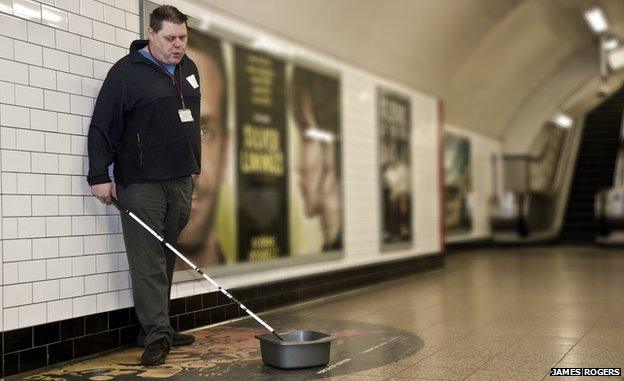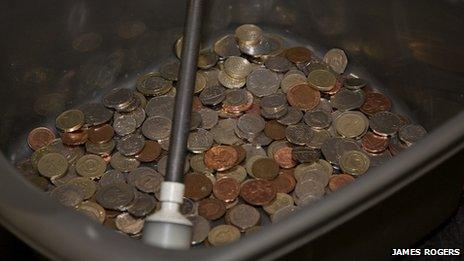Blind busker: A subterranean story
- Published

Mark Campbell's busking licence describes him as a "human whistler"
If you've travelled on the London Underground, you may have come across a whistling blind busker and wondered why he does it.
When Mark Campbell found himself unemployed in 1992, he didn't know in which direction to turn as opportunities are very limited if you can't see.
The 52-year-old has been blind since birth and had been comfortably in employment as a telephonist for West Mercia Police - then a common profession for blind people, but now superseded by technology.
"The trade of telephonist was dying. I was wondering what am I going to do. I was on the dole, time was going by and it was pretty soul destroying."
Blind busker Mark Campbell whistling at St Paul's Tube station
Other classic blind professions were suggested, but Campbell turned them down.
"There were lots of things I didn't want to do, like a typist or word processor operator. I tried to become a piano tuner, but they wanted me to learn things like theorem of beats a second and Pythagoras."
After being jobless for more than a year, Campbell serendipitously found his calling.
"I was on the way home from Shrewsbury and we saw a man busking, playing music on the street. I turned to my mate and said 'I'm gonna have a go at that'. He said 'what are you going to do?' I thought about it for a second and said 'I can whistle'."
Amid laughter from friends, he borrowed a straw hat and set about whistling outside a branch of Boots on Shrewsbury's Pride Hill.
When they returned, his friends took the hat to a nearby pub and counted the money inside. After just 90 minutes, he had earned £36.80. They couldn't believe it.
"The weekly giro I'd been getting was something like £38. so in an hour and a half I did a couple of quid less than the cheque that was meant to last me the whole week.
"The next day I went to the same spot, this time for three and a half hours. I got £90. That was it, I didn't look back - you could earn proper money."
Campbell has developed a repertoire of tunes and has thematic cycles, as he calls them.
"I do a cross through the Beatles, Frank Sinatra, through to lots of hymns and things like that - people love hymns. I'm not a particularly religious man myself but they're very popular. I do Bach to roots reggae and old soul too.
"You have to compromise your own music tastes because you're not there to please yourself, you're there for what the public will want to hear and, touch wood, it works."
Nineteen years later, Campbell is still whistling for a living and is now a regular performer on London's Underground network. A ban on busking on the Tube system was lifted in 2003 and a regulated system put in place.
Performers have to be of a certain standard to get a licence from Transport For London and Campbell successfully passed the audition.
"I did a couple of tunes for them. They held the auditions on the disused Jubilee line platform at Charing Cross station. There were three or four on the panel and you set yourself up in the way you'd appear on your pitch."
So, how much does he earn now? Campbell avoids a direct answer. "All you need to know is that I live in Wolverhampton, travel down to London four days a week, employ a helper and I make a good living."
The helper gets Campbell to his pitch, brings him drinks of water, banks his takings and other administrative functions. He checks back in with Campbell every 20 minutes but doesn't stay while he whistles because it puts people off giving.
When you think of a busker, you might conjure an image of someone performing with a violin case or a hat to collect tips but Campbell's years of practice have led him to use a washing-up bowl.
There's psychology at work here, he explains. "The thing that has to happen between punter and busker is that they have to like what you do but, in terms of them giving you money, it has to be a very minimal interaction.
"I experimented over the years using wider receptacles but a washing-up bowl is perfect for people because it's big and it's easy."
Smaller receptacles, he says, mean punters have to step out of a crowd and physically engage with what he's doing rather than just casually tossing an appreciative coin in his direction.
The streets of Campbell's home town Wolverhampton are not as safe an environment for busking as in the public passageways below London with its official scheme, he says.
But personal safety aside, even though Campbell stands with his white cane in his collection bowl to try and detect unusual movement, he thinks that people do steal from him - though he can't be entirely sure.
He judges it by the average number of £2 coins he expects to find in the bowl but which are sometimes conspicuously absent.
"You have a bowl with money and a blind man marshalling it, it's an ideal opportunity for thieving. When I first started on the streets, I don't think it happened hardly at all. Come the millennium it had increased 25%. Now I have thieving every single day."

But, these difficulties aside, does being blind help in a profession where people volunteer a donation?
"It's got to be faced that probably 25% of my money comes as a result of the sympathy card. I really do believe that is a factor. It'd be stupid to say it's not. Fortunately I don't believe it's the main factor any more.
"I probably do earn more money than other buskers but I don't believe all other buskers know the psychological hooks like bowl size. Playing the stuff you like is a nice luxury, but if you want to make proper money out of busking, you've got to do the stuff the public like."
Mark Campbell can be heard on the latest episode of the BBC's Ouch! talkshow
You can follow the Magazine on Twitter, external and on Facebook, external